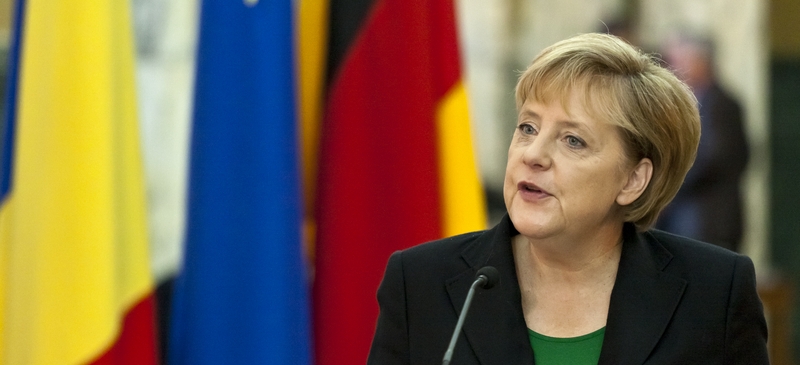
The genius of Merkel - Germans love her, Europe loathes her. Why?
Greek newspapers like to portray German Chancellor Angela Merkel in Nazi uniform. The Italian daily Libero has greeted her with a rude Vaffanmerkel! on its cover. The New Statesman has declared her "Europe's most dangerous leader." Many here in Britain think that Merkel's austerity drive is destroying the euro. In my home country Germany, meanwhile, Merkel is the most popular politician bar none. She is almost guaranteed to be re-elected for a third term in 2013. Why do the Germans cheer their leader while the rest of Europe seems to loathe her?
One fundamental reason for Merkel's persistent popularity is the German economy. It's hard to imagine if you sit in Greece, Spain or even depressed Britain. But German output has risen by around 8 per cent since the start of the euro crisis, according to the German economics ministry. The German export juggernaut is purring along nicely. Unemployment is at a record low and wages are finally rising. What's not to like?
The Germans give Merkel a lot of credit for having protected them against the crisis. That credit is not fully earned—the labour market reforms pushed through by her predecessor Gerhard Schröder have a lot to do with Germany's current success; as does strong Asian demand for German cars and machine tools and a modestly priced euro. But Merkel appears careful not to squander taxpayers' money on euro bailouts and she is tough on southern European countries that are slow to reform. Most Germans wholeheartedly approve of Merkel's handling of the euro crisis.
Another reason why the Germans love their chancellor is that she avoids scandal and bling. She still resides in her modest Berlin flat rather than the airy apartments of the chancellery. She is often seen in her local supermarket. In July she wore the same dress to the Bayreuth opera as she did in 2008. Most Germans are frugal. Merkel is too. Even her earthy laugh and her addiction to text messaging signal that she is just like you.
Merkel is also a very cautious politician who hates big statements. She is often underestimated. She tends to under-promise and over-deliver. She can be ruthless in getting rid of potential political challengers but she never says a bad word about her opponents. These traits have made her politically unassailable at home.
But perhaps most important, Merkel is the epitome of German politics. Germany's post-war constitution (written with a little help from the Americans and British) created a political system that values caution and consensus and prevents rash decision-making. Merkel is exceptionally good at knocking heads together and getting people to agree on solutions. She has no ego. Nor is she weighed down by inflexible political principles (opposition parties rightly complain that Merkel keeps taking over their most popular ideas). The euro crisis has helped her to look even more presidential as she travels from summit to summit. She seems to float above the petty squabbles that dominate the German parliament.
Germans think the ability to create consensus is important for leadership. For Britons, accustomed to the adversarial politics of first-past-the-post voting and prime minister's question time, this is almost impossible to understand. Merkel simply would not work in Westminster. The Germans, on the other hand, would probably find most British leaders loud-mouthed, impulsive and unnecessarily combative in style.
In any case, the differences between Germany and the rest of Europe are somewhat exaggerated. The media loves Merkel-bashing but Europeans seem to hold her in grudging respect. Earlier this year, the Pew Global Attitude Project found that in all large European countries people gave Merkel higher marks for handling the euro crisis than their own respective leaders. Two-thirds of Britons applauded Merkel, but only 51 per cent thought Cameron was doing well. Also, the British-German love-in at the last EU summit (where Merkel backed Cameron's veto of a bigger EU budget) has revealed that Merkel and Cameron can make common cause.
Merkel is a euro pragmatist. She firmly believes in the economic and political benefits that European integration brings for Germany. But she is no bleary-eyed federalist. In that sense, she is closer to most British politicians than to former German leaders such as Helmut Kohl or Hans-Dietrich Genscher. But make no mistake: this also means that Merkel will stand up for German national interests whenever that is necessary. This new German assertiveness will keep Merkel's approval ratings up at home but it will put her at odds with other Europeans.
